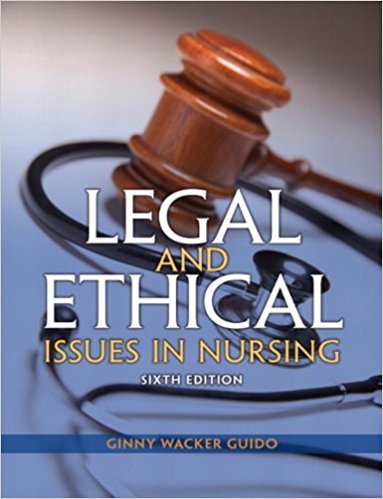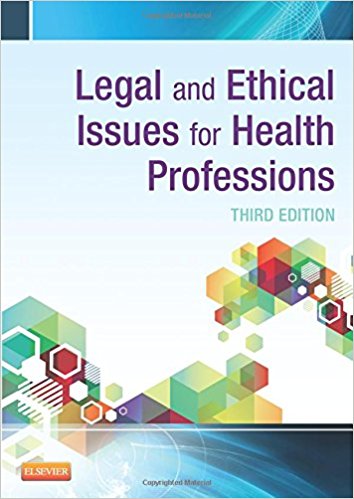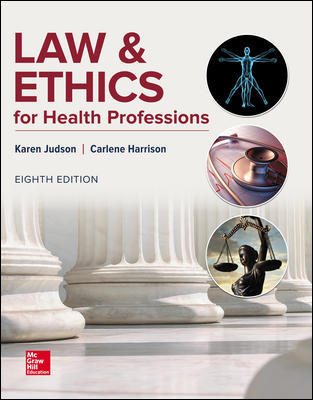Legal And Ethical Issues in Nursing 6th Edition by Ginny Wacker Guido – Test Bank
Guido, Legal and Ethical Issues in Nursing, 6e
Chapter 03
Question 1
Type: MCMA
Which statements would the nurse evaluate as correctly identifying difference between ethics and law?
Note: Credit will be given only if all correct choices and no incorrect choices are selected.
Standard Text: Select all that apply.
1. Ethics applies to conduct and actions, and the law applies to motive and attitude.
2. Ethics focuses on the individual whereas law focuses on society as a whole.
3. Ethics are externally determined.
4. Law relies heavily on judicial enforcement.
5. Ethics can change situationally, but laws are static and unchangeable.
Correct Answer: 2,4
Rationale 1: Both ethics and the law apply to conduct, actions, and motive. Attitude is more associated with ethics.
Rationale 2: Ethics, like values, is individualistic and is subject to philosophical, moral, and individual interpretations. The law focuses on rules and regulations that guide society in a formal and binding manner.
Rationale 3: Ethics describes conduct or principles that are internalized.
Rationale 4: The legal system, including the judicial branch, is founded on rules and regulations that guide society in a formal and binding manner.
Rationale 5: Ethical values are subject to philosophical, moral, and individual interpretations and may change as the person grows and develops. Laws are more formal, but can also be changed.
Global Rationale:
Cognitive Level: Analyzing
Client Need: Safe Effective Care Environment
Client Need Sub: Management of Care
Nursing/Integrated Concepts: Nursing Process: Evaluation
Learning Outcome: 3.2 Distinguish law from ethics.
Question 2
Type: MCSA
The nurse bases individual nursing practice upon commitment to quality patient care and understanding of the nursing role. Under which broad classification of ethical theory does this fall?
1. Applied theories
2. Utilitarian theories
3. Deontological theories
4. Teleological theories
Correct Answer: 3
Rationale 1: Applied ethics analyzes specific, controversial moral issues and is not a broad category of ethics that serves as a basis for daily decisions.
Rationale 2: Utilitarian theory states that what makes an action right or wrong is its utility, with useful actions bringing about the greatest good for the greatest number of people. Following utilitarian principles will not always support providing excellent nursing care to an individual.
Rationale 3: Deontological theories derive norms and rules from the duties human beings owe one another by virtue of commitments that are made and roles that are assumed. The nurse makes a commitment to excellence of patient care.
Rationale 4: Teleological theories derive norms or rules for conduct from the consequences of actions. Teleological principles do not support excellence in individual care.
Global Rationale:
Cognitive Level: Applying
Client Need: Safe Effective Care Environment
Client Need Sub: Management of Care
Nursing/Integrated Concepts: Nursing Process: Planning
Learning Outcome: 3.1 Compare and contrast the different ethical theories that underlie ethical nursing practice.
Question 3
Type: MCSA
The hospital ethics committee has decided to move to the relational ethics framework for decision making. What change should the committee members expect from this framework shift?
1. Decisions made will be more practical and action oriented.
2. The number of options for discussion will be reduced.
3. Use of other ethical theories and guidelines will be eliminated.
4. The impact of the environment on the decision will be reduced.
Correct Answer: 1
Rationale 1: Relational ethics moves decisions into the context of the environment in which these decisions are made, creating more “practical action-oriented” ethics.
Rationale 2: Relational ethics is not meant to reduce the amount of options discussed.
Rationale 3: Relational ethics is not meant to eliminate other ethical theories and guidelines.
Rationale 4: Relational ethics moves decision making into the context of the environment in which the decisions are made.
Global Rationale:
Cognitive Level: Analyzing
Client Need: Safe Effective Care Environment
Client Need Sub: Management of Care
Nursing/Integrated Concepts: Nursing Process: Planning
Learning Outcome: 3.1 Compare and contrast the different ethical theories that underlie ethical nursing practice.
Question 4
Type: MCSA
The nurse advises a patient to have surgery because, “The doctor knows what is best for you.” The nurse is most likely following which ethical principle?
1. Respect for others
2. Paternalism
3. Justice
4. Fidelity
Correct Answer: 2
Rationale 1: Respect for others acknowledges the right of individuals to make decisions and to live or die based on those decisions.
Rationale 2: Paternalism is allowing someone else to make a decision for another and allows no collaboration in the decision-making process. In this scenario the nurse is encouraging the patient to let someone else (the physician) make treatment decisions.
Rationale 3: Justice states that people should be treated fairly and equally. Nothing in this scenario demonstrates use of justice.
Rationale 4: Fidelity is keeping one’s promises or commitments. Nothing in this scenario demonstrates fidelity.
Global Rationale:
Cognitive Level: Applying
Client Need: Safe Effective Care Environment
Client Need Sub: Management of Care
Nursing/Integrated Concepts: Nursing Process: Implementation
Learning Outcome: 3.3 Define and apply to nursing practice the ethical principles of autonomy, beneficence, nonmaleficence, veracity, fidelity, justice, paternalism, and respect for others.












Reviews
There are no reviews yet.